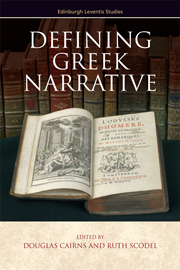Book contents
- Frontmatter
- Contents
- Preface
- Notes on Contributors
- 1 Introduction
- PART I DEFINING THE GREEK TRADITION
- 2 Beyond Auerbach: Homeric Narrative and the Epic of Gilgamesh
- 3 Homeric Battle Narrative and the Ancient Near East
- 4 Narrative Focus and Elusive Thought in Homer
- 5 Structure as Interpretation in the Homeric Odyssey
- PART II THE DEVELOPMENT OF THE GREEK TRADITION
- PART III BEYOND GREECE
- Bibliography
- Index
4 - Narrative Focus and Elusive Thought in Homer
from PART I - DEFINING THE GREEK TRADITION
Published online by Cambridge University Press: 05 September 2014
- Frontmatter
- Contents
- Preface
- Notes on Contributors
- 1 Introduction
- PART I DEFINING THE GREEK TRADITION
- 2 Beyond Auerbach: Homeric Narrative and the Epic of Gilgamesh
- 3 Homeric Battle Narrative and the Ancient Near East
- 4 Narrative Focus and Elusive Thought in Homer
- 5 Structure as Interpretation in the Homeric Odyssey
- PART II THE DEVELOPMENT OF THE GREEK TRADITION
- PART III BEYOND GREECE
- Bibliography
- Index
Summary
This chapter will consider three aspects of Homeric narrative whose interaction produces characteristic and influential effects. The first, and most famous, is reliance on direct speech. Homer accomplishes his characterisations largely through speeches (including speeches in which characters attribute motives or traits to each other). By itself, Homer's reliance on direct speech does not mark a uniquely Greek narrative tradition, since Sanskrit epic, for example, also presents many speeches. Furthermore, the evidence suggests that in this respect the Homeric epics were outliers in early Greek epic tradition (Aristotle, Poetics 1460a5–11), and Apollonius uses direct speech far less than the Homeric epics do.
Reliance on character-speech is one typical quality of Homeric narrative. Others are not quite as familiar. First, ‘interest-focus’ – where the audience directs its attention – changes frequently. ‘Interestfocus’ is Chatman's term; structuralist narratology has not given careful attention to interest-focus, perhaps because it is so closely connected to characterisation, which classic narratology neglected. Also, structuralist narratologists were preoccupied with precision about the nature of focalisation in the strict sense, and with critiques of the concept. Shifts of interest-focus do not present such difficult theoretical problems, even though they are inherently harder to define with precision.
- Type
- Chapter
- Information
- Defining Greek Narrative , pp. 55 - 74Publisher: Edinburgh University PressPrint publication year: 2014



